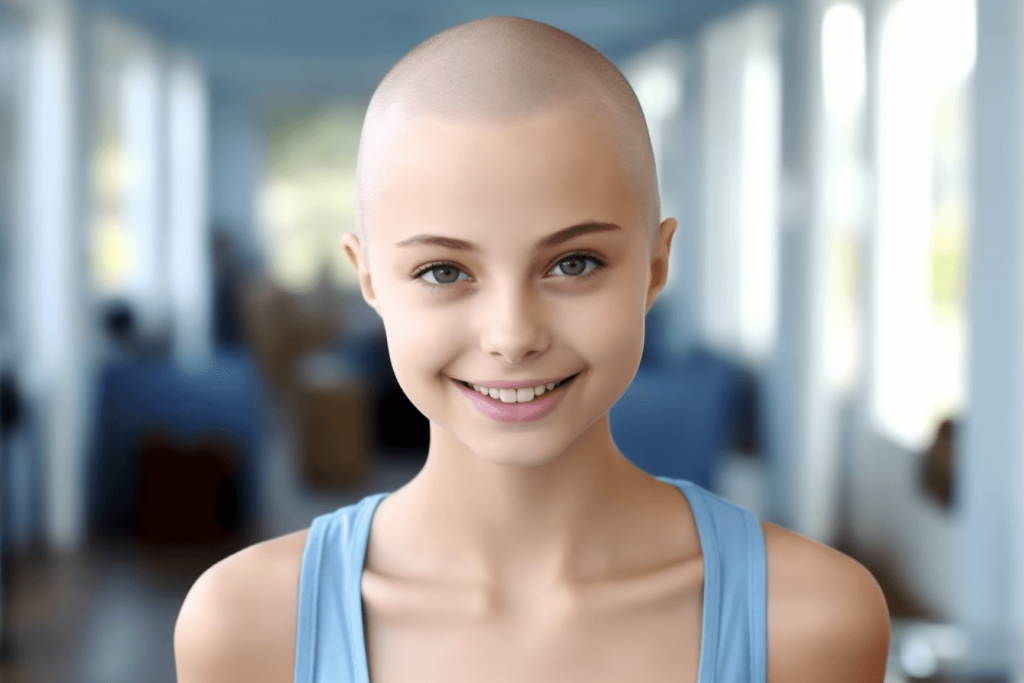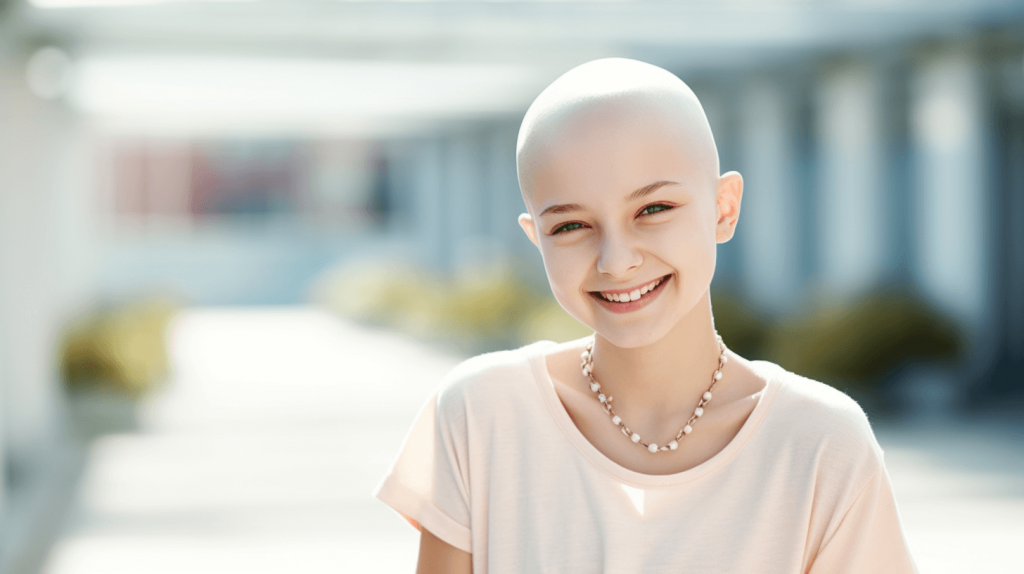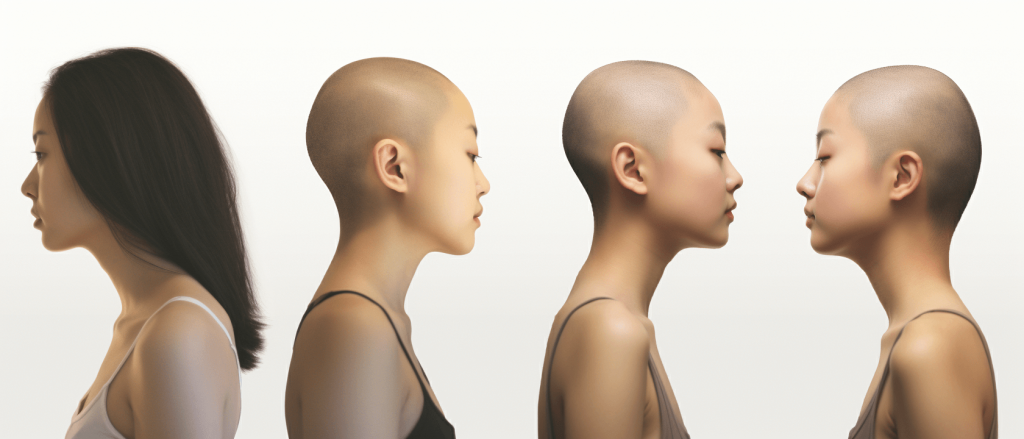Dealing with Hair Loss During Cancer Treatment
Published on 19 Jun 2021

Dealing with hair loss is not an easy task and causes both physical and mental stress. Hair loss is something, that can not be avoided during cancer treatment. However, it is reversible and temporary in most cases, it is to be noted that it isn't cancer that causes hair loss; it is the procedure that does.

Also Read: Cancer Hair Loss: During and After Chemotherapy
According to the National Cancer Institute, chemotherapy and radiotherapy can cause hair loss or alopecia. Chemotherapy affects hair on the head and other parts of the body, while radiation therapy causes hair to fall in that particular part of the body that is being treated.
Causes of Hair Fall During Cancer Treatment
- Chemotherapy: The drugs administered to the patient during this procedure damage the hair follicles, causing hair to fall. Each person gets affected differently, and hence it becomes difficult to predict whether the patient will lose hair in only certain parts or all over the body. Some drugs are also known to cause thinning of hair strands only and not lead to completehair loss.
- Immunotherapy:Some of the drugs administered duringImmunotherapycan cause hair to fall as well. In many cases, this begins to affect any time between six weeks to three months from the time of treatment. Other side effects ofImmunotherapyinclude hair growth in unexpected parts of the body like excessive facial hair in women.
- Radiation Therapy: In the case of Radiation Therapy, the area targeted for treatment is the one which gets affected the most, and hence hair fall happens specifically in that particular region. This happens because Radiation Therapy focuses on the rapid destruction of cancerous cells and can sometimes affect normal cells as well. This results in the thinning of hair and ultimately alopecia.
It's important to find the strength to fight against it and accept that whatever is happening is a temporary thing. Some of the best cancer hospitals out there insist on certain measures that the patient can follow to sail through the process more smoothly.
Following are some of the effective ways that can help you deal withhair lossduring cancer treatment
Accept that it is okay to feel unhappy
It is normal if you feel unhappy about something in your life. Accepting a difficult situation is an important step in the entire process, and you should be proud of yourself for having the courage to take it. Accepting hair fall will help you move on to the next stage, which is looking for ways to deal with it.
Try using silk pillow covers
Using silk pillow covers helps your hair to move freely while you sleep which decreases the chances of it getting damaged. In the case of cotton covers, there are more chances of getting your hair clumped in one particular area, thus resulting in knots, fuzzy hair, or dry scalp, which increases hair fall.
Be gentle, and massage your scalp often with warm oil
Heat 2-3 tbsps of coconut oil with Amla pieces or 5-6 curry leaves, cool and massage onto the roots. Keep it overnight. The next morning, Wash it off with shampoo. Considering an age-old remedy to a wide array of hair problems, coconut oil helps promote hair growth and nourishes your scalp, leading to a noticeable change in hair thickness and length.
Eat good protein-rich food
Managing your diet is very important while trying to maintain your hair fall. It should have good amounts of proteins in it as our hair roots are also made up of a protein called keratin. Popular protein-rich foods include dry fruits like almonds, walnuts and pistachios, lentils, eggs, fish, cottage cheese, and green leafy vegetables.

Also Read: Chemotherapy Hair Loss
Try using an egg mask
For this, you have to add the yolk of about 2-3 eggs along with someAloe Veraextracts. Apply this mask overnight and wash it off the next day. This can result in improved hair texture along with curbing hair breakage, split ends, and leading to stronger and thicker hair in the long run.
Try scalp-cooling caps
Scalp-cooling caps are now being advised as a way to deal withHair losscaused byChemotherapy. This decreases the amount of medicine reaching the hair roots by thinning down the blood vessels near the scalp. Since a lesser amount of medicine reaches the roots, the hair fall is expected to decrease slowly.
Consider shaving your hair all the way
After reaching a certain point in the cancer treatment, it might be difficult to control periodic hair fall. A lot of patients have trouble coping with it mentally. If you feel comfortable with shaving your hair, then you must opt for it. Shaving your head beforehand might help make the entire process easier. There are a variety of hair coverings and wigs available that might work as a temporary solution until the end of the treatment. Remember that this is indeed temporary and that in most cases, the hair does grow back. Meanwhile, it might be fun to try some new hairstyles and experiment a little.

Going throughCancer Treatmentis often described as nothing less than a battle. Don't be afraid to open up and ask for help whenever necessary. Hair fall is one of the most obvious side effects of the treatment, and it can be difficult to deal with it alone. Remember that there are several ways to cope with it, as mentioned above.
Expert Advice:
Patients typically experience hair loss as a result of the medications they are given during chemo and radiation therapy. Some of the many drugs that cause hair loss during and after chemotherapy include adriamycin, cyclophosphamide, dactinomycin, docetaxel, and Xeloda. In this case, the most effective treatment is NILINI Rasayana, which is the most reliable formulation available in Ayurvedic medical science for cancer patients. It is made from the herb and medicinal plant Nilini to create an oil and extract. According to experts, applying the oil and consuming the extract significantly reduces hair fall by up to 80%. Additionally, this formulation aids in the faster restoration of hair post-chemo.
Remarkably, this Ayurvedic medication has no side effects for 95% of patients. While only 5% of Stage 4 cancer patients experience side effects, they can be managed with dosage adjustments and home remedies.
This medication is not only limited to cancer patients; the general public can use it as well, however, with proper guidance, consultation, and dosage.
Along with it, experts recommend Omega capsules, Vitamins A, D, C, Zinc, and Iron supplements, and a proper high-nutrition diet, for hair growth and replenishment. Green vegetable soup, for example, should be consumed half an hour after meals. This aids in the absorption of antioxidants and flavonoids. Japans high health index is due solely to this factor. Soups, on the other hand, are used as appetisers in India. We can only expect the best health outcomes if our bodies can absorb all nutrients, including antioxidants and flavonoids. Therefore, patients should follow a proper anti-cancer diet to regrow hair of the highest quality.
Furthermore, when people living with cancer lose their hair, they may express confusion, sadness, embarrassment, anger, fear and many other emotions. Caregivers and parents can help their loved ones cope with hair loss by being present and providing practical and emotional support.
- Listen to and validate their feelings:Hair loss can elicit strong expressions of emotion as it signals a change in appearance that may impact self-esteem. In many cultures, hair can provide an exceptionally powerful sense of personal identity.
- Provide space for your loved one to process their feelings in ways that feel appropriate to them:Being present and listening can be powerful and help people with cancer feel supported.
- Provide practical support: If your loved one is interested in a wig or a similar alternative, offer to help them find a local wig clinic in your community. As hair loss can leave the scalp vulnerable to sunburn and treatment can cause skin to be more sensitive to the sun, you can help your loved one find the proper sunscreen and skin care products. Talk to your loved ones healthcare team about local resources.
- Establish new routines and maintain existing connections:Physical changes can make your loved one self-conscious, and hair loss can serve as an external marker of ones diagnosis and treatment experience. Ask your loved one what social situations they would feel most supported in. Consider engaging close friends and family in spaces of mutual comfort soon after hair loss occurs, as it can take loved ones time to adjust to physical changes as well.
- Stay active: Encourage your loved one to do yoga, practice meditation, listen to music or engage in other activities of interest to them. Relying on existing physical and mental routines can give people with cancer a sense of control and confidence, and can serve as outlets for processing feelings. Doctors can help provide insight into exercise routines for people of various ability levels to improve self-esteem, strength and health.
- Talk to your loved one about joining a support group:Support groups provide people with cancer a chance to meet one another and discuss commonalities and differences in their illness experiences. Groups can help people experiencing hair loss and other changing physical realities as people with cancer and professionals can share means of practical coping and provide emotional support. CancerCare offers free face-to-face, telephone and online support groups led by professional oncology social workers.
- Cope incrementally: Feelings about hair loss may change over time. Wearing a wig or head covering may or may not feel comfortable. Both you and your loved one should take the adjustment process one day at a time, practise patience and seek professional support to help you both cope with the impact of hair loss.
Relief & Comfort from pain and other side effects in Your Cancer Journey
For personalized guidance on cancer treatments and complementary therapies, consult our experts atZenOnco.ioor call+91 9930709000
Reference:
-
Saraswat N, Chopra A, Sood A, Kamboj P, Kumar S. A Descriptive Study to Analyze Chemotherapy-Induced Hair Loss and its Psychosocial Impact in Adults: Our Experience from a Tertiary Care Hospital. Indian Dermatol Online J. 2019 Jul-Aug;10(4):426-430. doi: 10.4103/idoj.IDOJ_471_18. PMID: 31334063; PMCID: PMC6615375.
-
Wikramanayake TC, Haberland NI, Akhundlu A, Laboy Nieves A, Miteva M. Prevention and Treatment of Chemotherapy-Induced Alopecia: What Is Available and What Is Coming? Curr Oncol. 2023 Mar 25;30(4):3609-3626. doi: 10.3390/curroncol30040275. PMID: 37185388; PMCID: PMC10137043.





















